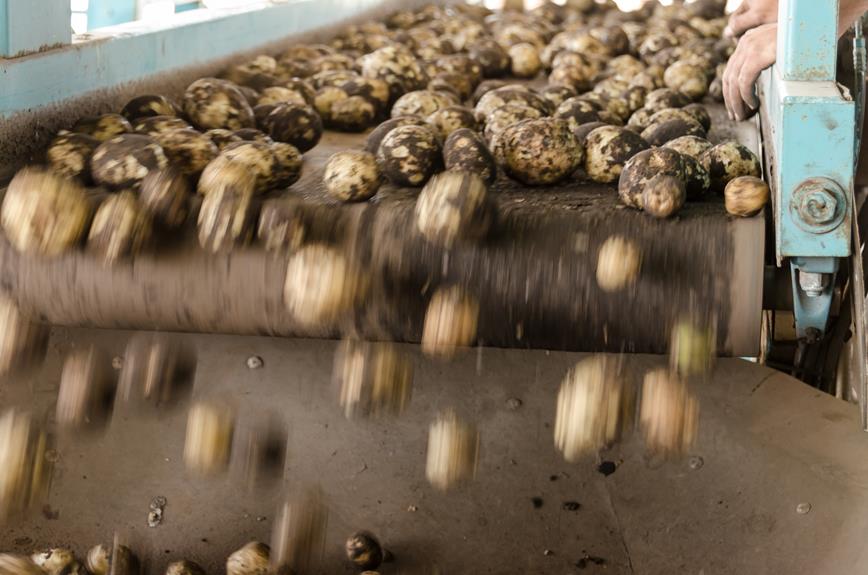Are you interested in sustainable farming and organic food production?
Discover the 12 essential practices that can make a difference.
Learn how crop rotation, composting, and integrated pest management can help you grow healthier and more environmentally-friendly crops.
Find out about water and soil conservation techniques, agroforestry practices, and the use of renewable energy.
Explore sustainable irrigation methods and ways to reduce food waste.
Get ready to take your farming to the next level and make a positive impact on our planet.
Crop Rotation
To ensure the long-term health and productivity of your organic farm, you should implement crop rotation, a practice that involves alternating the types of crops grown in specific fields. Crop rotation is essential for maintaining soil health and fertility. When the same crop is planted in the same field year after year, it depletes the soil of specific nutrients, leading to nutrient imbalances and increased susceptibility to pests and diseases. By rotating crops, you can help replenish the soil with essential nutrients and reduce the risk of pest infestations.
Crop rotation also helps break the life cycles of pests and diseases. Different crops have different vulnerabilities, and rotating them disrupts the cycle of pests and diseases that target specific plants. This reduces the need for chemical pesticides and promotes natural pest control methods. Additionally, crop rotation can help control weeds. Some crops suppress weed growth, while others are more susceptible to weed competition. By alternating between these crops, you can minimize weed pressure and reduce the need for herbicides.
Furthermore, crop rotation improves soil structure. Certain crops, like legumes, have nitrogen-fixing abilities, which means they can convert atmospheric nitrogen into a form that plants can use. This not only enriches the soil with nitrogen but also enhances its overall structure and fertility. In contrast, continuous cultivation of the same crop can lead to soil compaction, erosion, and reduced water infiltration. By practicing crop rotation, you can maintain a healthy soil structure that supports optimal plant growth and nutrient absorption.
Composting
Now let's talk about composting and its benefits.
Composting is a crucial practice in sustainable farming that helps enrich the soil and reduce waste. By decomposing organic materials like food scraps and yard waste, composting creates nutrient-rich humus that improves soil structure and fertility.
Let's explore some techniques to effectively implement composting on your organic farm.
Benefits of Composting
Composting offers numerous benefits for organic food production, enabling you to recycle organic waste into nutrient-rich soil amendments. Here are three key benefits of composting:
- Improved Soil Health: Composting enriches the soil by increasing its organic matter content. This results in improved soil structure, enhanced water retention, and increased nutrient availability for plants. It also promotes beneficial microbial activity, which helps suppress plant diseases and pests.
- Reduced Environmental Impact: By composting organic waste, you can divert it from landfills, reducing methane emissions and the need for chemical fertilizers. Composting also helps prevent soil erosion and enhances biodiversity, promoting a healthier ecosystem.
- Cost Savings: Composting reduces the need to purchase expensive synthetic fertilizers and soil amendments. By producing your own compost, you can save money and minimize your reliance on external inputs.
Incorporating composting techniques into your organic farming practices can significantly contribute to sustainable food production and environmental stewardship.
Composting Techniques Explained
Incorporate various composting techniques to maximize the benefits of organic waste recycling in your sustainable farming practices. Composting is a crucial component of organic food production as it helps to enrich the soil, reduce the need for synthetic fertilizers, and promote a healthy ecosystem on your farm. Two popular composting techniques to consider are compost tea and vermicomposting.
Compost tea is a liquid fertilizer that is made by steeping compost in water. It is rich in nutrients and beneficial microbes, which can be sprayed directly onto plants or used to water them. This technique helps to improve soil fertility and enhance plant growth.
Vermicomposting, on the other hand, involves the use of worms to break down organic waste into nutrient-rich vermicompost. This process is ideal for small-scale farming operations and can be done indoors or outdoors.
By incorporating these composting techniques into your farming practices, you can effectively recycle organic waste and improve the overall health and productivity of your farm.
| Composting Technique | Benefits | |
|---|---|---|
| Benefits of Agroforestry Practices | ||
| Enhanced soil fertility | Biodiversity conservation | Climate change resilience |
| Soil erosion prevention | Reduced need for synthetic fertilizers | Improved water management |
| Increased carbon sequestration | Diversified income streams | Improved microclimate |
| Nutrient cycling | Livestock forage and shade | Improved pest control |
Incorporating agroforestry practices into your organic farming operation can greatly contribute to sustainability and long-term success. By harnessing the power of nature and creating a balanced ecosystem, you can cultivate healthy soils, promote biodiversity, and mitigate the impacts of climate change. So, why not embrace agroforestry and reap the rewards it offers?
Renewable Energy Usage
To implement renewable energy usage in your sustainable organic farming practices, consider incorporating solar panels or wind turbines on your farm. By utilizing renewable energy sources, you can reduce your reliance on non-renewable energy and contribute to a more sustainable future.
Here are three ways you can integrate renewable energy into your farming operations:
- Install solar panels: Solar panels harness the power of the sun to generate electricity. By installing solar panels on your farm, you can generate clean and renewable energy to power your operations. This not only reduces your carbon footprint but also helps you save on energy costs in the long run.
- Utilize wind turbines: Wind turbines are another excellent option for generating renewable energy. By harnessing the power of the wind, you can produce electricity to meet your farm's energy needs. Wind turbines are particularly beneficial in areas with consistent wind patterns, as they can provide a stable source of renewable energy.
- Implement energy-efficient practices: In addition to installing renewable energy systems, it's essential to adopt sustainable energy practices. This can include optimizing energy use by using energy-efficient equipment and appliances, implementing energy-saving measures such as insulation and proper ventilation, and regularly monitoring and maintaining your renewable energy systems to ensure their optimal performance.
Sustainable Irrigation Methods
When considering sustainable irrigation methods for your organic farming practices, prioritize water conservation and efficiency. One effective method to achieve this is through the use of drip irrigation. Drip irrigation is a system where water is delivered directly to the roots of the plants, minimizing water loss due to evaporation and runoff. This method not only ensures that water is used efficiently, but it also reduces the risk of diseases caused by excessive moisture on the leaves.
To further promote sustainable water usage, it's important to monitor and manage your irrigation system effectively. Regularly check for leaks or blockages in the system to prevent wastage of water. Adjust the irrigation schedule according to the weather conditions and the specific needs of your crops. By using weather-based sensors or soil moisture monitors, you can ensure that water is applied only when necessary.
Additionally, consider implementing techniques such as mulching and rainwater harvesting to supplement your irrigation needs. Mulching helps to retain moisture in the soil, reducing the frequency of irrigation. Rainwater harvesting involves collecting and storing rainwater to use for irrigation purposes. This reduces the reliance on groundwater or other water sources, contributing to sustainable water management on your farm.
Food Waste Reduction
By incorporating sustainable irrigation methods to conserve water, you can also focus on reducing food waste in your organic farming practices. Food waste management is an essential aspect of sustainable agriculture, as it helps minimize environmental impact and maximize resource efficiency. Here are three effective techniques you can employ to reduce food waste on your farm:
- Implement proper harvesting and storage practices: Harvest crops at the right time to ensure optimal freshness and minimize spoilage. Store harvested produce in appropriate conditions, such as cool and dry areas, to extend their shelf life and reduce the chances of rotting or wilting.
- Practice on-farm processing and value addition: Instead of discarding imperfect or surplus produce, explore creative ways to process and add value to them. For example, you can turn excess fruits into jams or preserves, or use leftover vegetable scraps to make nutrient-rich compost.
- Embrace composting techniques: Composting is an excellent method to divert food waste from landfills and transform it into nutrient-rich organic matter. Set up a composting system on your farm to decompose food scraps, plant residues, and other organic materials. This compost can then be used to enrich soil fertility and enhance the health of your crops.




